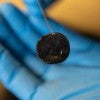
Bacterial sensors send a jolt of electricity when triggered
Rice researchers develop programmable bacteria that sense contaminants and release an electronic signal in real time.

Bacterial sensors send a jolt of electricity when triggered
Rice researchers develop programmable bacteria that sense contaminants and release an electronic signal in real time.
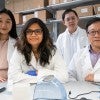
Even good gene edits can go bad
A Rice lab leads the effort to reveal threats to the efficacy of gene editing, even when it appears to be working.

Rice lab grows macroscale, modular materials from bacteria
Rice bioscientists have created bacteria that self-assembles into a material like putty that could soak up pollutants.
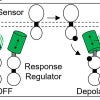
Glowing tags reveal split-second activity of pathogenic circuitry
Rice bioengineers have created the first tool for observing the real-time activity of biology’s most ubiquitous signal-processing circuits.
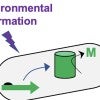
Rice team eyes cells for sophisticated data storage
Rice University receives National Science Foundation support to turn living cells, starting with bacteria, into random-access memory devices. These will be able to store and report data about their environments.
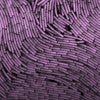
Rice bioengineers are shining light on bacterial stress
Rice bioengineers are ready to shine a lot of light on bacteria’s genetic response to stress.

Living sensor research wins federal backing
Rice researchers are leading a federally funded project to improve communications between microelectronics and microorganisms.
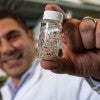
‘Drug factory’ implants eliminate ovarian, colorectal cancer in mice
Rice bioengineers have created tiny implants that activate immune cells to destroy cancer.

Trailblazing Rice bioengineer is turning cells into disease fighters
Rice University bioengineer Isaac Hilton has been awarded an NIH Trailblazer Award to create synthetic circular DNA that can be used to reprogram cells as disease fighters.

‘Smart cells’ show promise to treat disease
Laura Segatori wins NIH backing to develop synthetic biological circuits for cells that may someday sense trouble and respond by making just enough of the appropriate drugs.
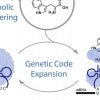
Programmed bacteria have something extra
Rice chemists expand genetic code of E. coli to produce 21st amino acid, giving it new abilities.
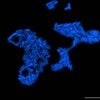
Bacteria have sensors to shut toxin down
Researchers at Rice University and the University of Idaho helped identify a protein that senses and binds to formaldehyde to tell cells that toxic formaldehyde is building up.

Engineered organism could diagnose Crohn's disease flareups
Rice University researchers have engineered a bacterium capable of diagnosing a human disease, a milestone in the field of synthetic biology.
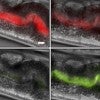
Light flips genetic switch in bacteria inside transparent worms
Researchers from Rice University and Baylor College of Medicine have shown that colored light can both activate and deactivate genes of gut bacteria in the intestines of worms. The research shows how optogenetic technology can be used to investigate the health impacts of gut bacteria.
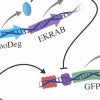
Strong signals show how proteins come and go
Rice University bioscientists develop a versatile gene signal amplifier that can not only do a better job of detecting the expression of chromosomal genes than current methods but can potentially be used to detect any cellular gene.